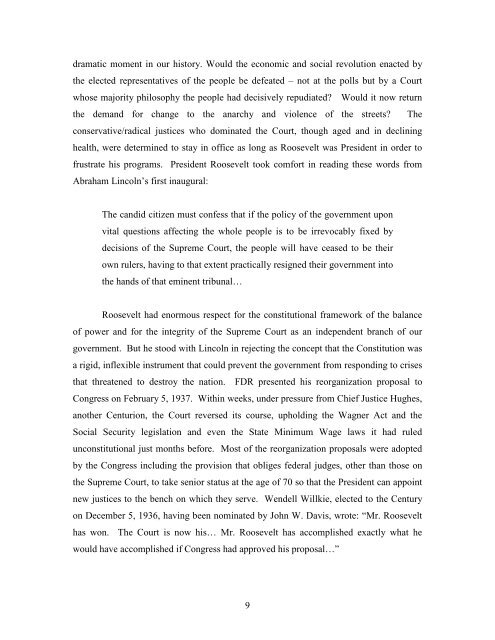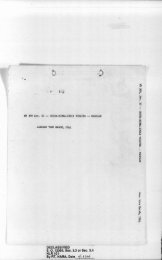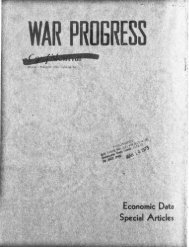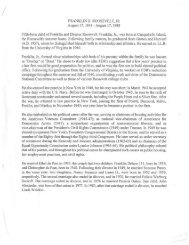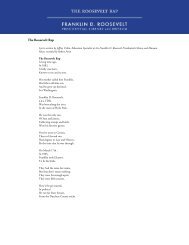Franklin Delano Roosevelt A Man of the Century
Franklin Delano Roosevelt A Man of the Century
Franklin Delano Roosevelt A Man of the Century
Create successful ePaper yourself
Turn your PDF publications into a flip-book with our unique Google optimized e-Paper software.
dramatic moment in our history. Would <strong>the</strong> economic and social revolution enacted by<br />
<strong>the</strong> elected representatives <strong>of</strong> <strong>the</strong> people be defeated – not at <strong>the</strong> polls but by a Court<br />
whose majority philosophy <strong>the</strong> people had decisively repudiated? Would it now return<br />
<strong>the</strong> demand for change to <strong>the</strong> anarchy and violence <strong>of</strong> <strong>the</strong> streets? The<br />
conservative/radical justices who dominated <strong>the</strong> Court, though aged and in declining<br />
health, were determined to stay in <strong>of</strong>fice as long as <strong>Roosevelt</strong> was President in order to<br />
frustrate his programs. President <strong>Roosevelt</strong> took comfort in reading <strong>the</strong>se words from<br />
Abraham Lincoln’s first inaugural:<br />
The candid citizen must confess that if <strong>the</strong> policy <strong>of</strong> <strong>the</strong> government upon<br />
vital questions affecting <strong>the</strong> whole people is to be irrevocably fixed by<br />
decisions <strong>of</strong> <strong>the</strong> Supreme Court, <strong>the</strong> people will have ceased to be <strong>the</strong>ir<br />
own rulers, having to that extent practically resigned <strong>the</strong>ir government into<br />
<strong>the</strong> hands <strong>of</strong> that eminent tribunal…<br />
<strong>Roosevelt</strong> had enormous respect for <strong>the</strong> constitutional framework <strong>of</strong> <strong>the</strong> balance<br />
<strong>of</strong> power and for <strong>the</strong> integrity <strong>of</strong> <strong>the</strong> Supreme Court as an independent branch <strong>of</strong> our<br />
government. But he stood with Lincoln in rejecting <strong>the</strong> concept that <strong>the</strong> Constitution was<br />
a rigid, inflexible instrument that could prevent <strong>the</strong> government from responding to crises<br />
that threatened to destroy <strong>the</strong> nation. FDR presented his reorganization proposal to<br />
Congress on February 5, 1937. Within weeks, under pressure from Chief Justice Hughes,<br />
ano<strong>the</strong>r Centurion, <strong>the</strong> Court reversed its course, upholding <strong>the</strong> Wagner Act and <strong>the</strong><br />
Social Security legislation and even <strong>the</strong> State Minimum Wage laws it had ruled<br />
unconstitutional just months before. Most <strong>of</strong> <strong>the</strong> reorganization proposals were adopted<br />
by <strong>the</strong> Congress including <strong>the</strong> provision that obliges federal judges, o<strong>the</strong>r than those on<br />
<strong>the</strong> Supreme Court, to take senior status at <strong>the</strong> age <strong>of</strong> 70 so that <strong>the</strong> President can appoint<br />
new justices to <strong>the</strong> bench on which <strong>the</strong>y serve. Wendell Willkie, elected to <strong>the</strong> <strong>Century</strong><br />
on December 5, 1936, having been nominated by John W. Davis, wrote: “Mr. <strong>Roosevelt</strong><br />
has won. The Court is now his… Mr. <strong>Roosevelt</strong> has accomplished exactly what he<br />
would have accomplished if Congress had approved his proposal…”<br />
9


